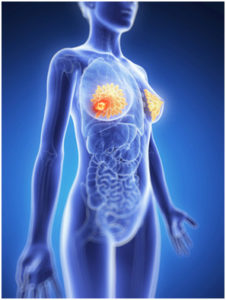Start Young And Finish Strong
 The idea that dietary fiber reduces the risk of breast cancer has been around for a long time. But it is controversial. It has been difficult to prove.
The idea that dietary fiber reduces the risk of breast cancer has been around for a long time. But it is controversial. It has been difficult to prove.
Part of the difficulty arises from what scientists call confounding variables. What do I mean by confounding variables? Let me explain.
A high fiber diet is usually a primarily plant-based diet. Plant foods contain much more than just fiber. They are full of antioxidants and phytonutrients. A primarily plant-based diet is, by definition, low in refined grains. It is usually low in sugar and saturated fat as well.
People who eat primarily plant-based diets are often health conscious. They tend to exercise more, weigh less, and smoke less than the general public.
Each of these things are confounding variables. They could reduce the risk of breast cancer on their own. That confounds (makes it more difficult to interpret) the data. Was the reduction in breast cancer risk due to the high fiber diet or to these factors that go along with a high fiber diet?
It is possible to correct for these confounding variables statistically, but that requires a very large study (a large population group) for the correction to be accurate. Large studies are expensive. Thus, you tend to end up with lots of small studies. And once they have been corrected for confounding variables, small studies give conflicting results. Some show a benefit of fiber. Some do not.
That is why this study (MS Farvid et al, Cancer, DOI: 10.1002/cncr.32816) is important. It is a meta-analysis of 20 clinical studies with almost 2 million women.
How Was The Study Done?
 The meta-analysis combined data from 20 clinical studies with 1,994,910 women. Fiber intake was calculated from a food frequency questionnaire administered at the beginning of the study for all except one study that used 24-hour dietary records administered at the beginning of the study.
The meta-analysis combined data from 20 clinical studies with 1,994,910 women. Fiber intake was calculated from a food frequency questionnaire administered at the beginning of the study for all except one study that used 24-hour dietary records administered at the beginning of the study.
- Study duration ranged from 2 to 20 years. Nine of the studies (1.37 million women) lasted for 10 years or more.
- Four studies reported results for premenopausal breast cancer, fifteen studies reported results for postmenopausal breast cancer, and one study reported results for both.
Does Fiber Reduce Breast Cancer Risk?
 After correcting for confounding variables, the results of the study were as follows:
After correcting for confounding variables, the results of the study were as follows:
- When comparing the highest intake with the lowest intake, total fiber consumption was associated with an 8% lower risk of breast cancer.
- The effect was stronger for premenopausal breast cancer (18%) than for postmenopausal breast cancer (9%).
- The effect was greater with soluble fiber (10% decreased risk) than for insoluble fiber (7% decreased risk).
-
- Note: All plant foods contain a mixture of soluble fiber and insoluble fiber. However, the common foods richest in soluble fiber are fruits, oatmeal, nuts, beans, peas, and lentils.
The authors concluded, “A random-effects meta-analysis of prospective observational studies demonstrated that high total fiber consumption was associated with a reduced risk of breast cancer. This finding was consistent for soluble fiber as well as for women with premenopausal and postmenopausal cancer.”
Start Young And Finish Strong
 An 8% risk reduction doesn’t seem like very much, but the 18% risk reduction in premenopausal breast cancer caught my eye. With a little digging I found a study (MS Farvid et al, Pediatrics 137, March 2016: e20151226) that focused on the effect of fiber intake in young women on their subsequent risk developing both premenopausal and postmenopausal breast cancer. This was, in fact, one of the studies included in the meta-analysis I described above.
An 8% risk reduction doesn’t seem like very much, but the 18% risk reduction in premenopausal breast cancer caught my eye. With a little digging I found a study (MS Farvid et al, Pediatrics 137, March 2016: e20151226) that focused on the effect of fiber intake in young women on their subsequent risk developing both premenopausal and postmenopausal breast cancer. This was, in fact, one of the studies included in the meta-analysis I described above.
This study followed 90,534 women (mean age 36 years) for 20 years. The women competed a food frequency questionnaire at enrollment and every four years thereafter. They also completed a questionnaire about their diet during their teenage years.
When comparing the highest versus the lowest fiber intake:
- High fiber intake reduced total breast cancer risk by 19%.
-
- Postmenopausal breast cancer risk was reduced by 13%.
-
- Premenopausal breast cancer risk was reduced by 23%.
Interestingly, only 34% of women who consumed high fiber diets during their teenage years continued to consume high fiber diets as young adults. However, high fiber diets in the teenage years were important. When they looked at teenage diets:
- High fiber intake reduced total breast cancer risk by 16%.
-
- Postmenopausal breast cancer risk was reduced by 15%.
-
- Premenopausal breast cancer risk was reduced by 25%.
Other important observations from this study were:
- There was a 13% decrease in breast cancer risk for every 10 gram increase in fiber intake.
-
- 10 grams of fiber is equivalent to one apple plus two slices of 100% whole wheat toast or half a cup of cooked kidney beans plus half a cup of cooked cauliflower or squash.
- Both soluble fiber (14% decreased risk) and insoluble fiber (20% decreased risk) were effective.
-
- In terms of foods, the most significant effects were seen with fruits and vegetables.
The authors concluded, “Our findings support the hypothesis that higher fiber intakes reduce breast cancer risk and suggest that intake during adolescence and early adulthood may be particularly important.”
What Does This Mean For You?
 As I said before, an 8% decrease in breast cancer risk may not sound like much. You might be tempted to say, “Why bother? Why should I give up my favorite processed and convenience foods and switch to a more whole food, plant-based diet?”
As I said before, an 8% decrease in breast cancer risk may not sound like much. You might be tempted to say, “Why bother? Why should I give up my favorite processed and convenience foods and switch to a more whole food, plant-based diet?”
Here are some thoughts to consider:
1) As I mentioned above, there are side benefits to a plant-based diet.
-
- Plant based diets have a lower caloric density, so you are less likely to be overweight.
-
- Your intake of antioxidants and phytonutrients is increased.
-
- Plant foods feed beneficial gut bacteria.
-
- Your diet is likely to be lower in sugar, highly processed foods, and saturated fat.
All these factors decrease your risk of developing breast cancer, but they were statistically factored out in calculating the 8% reduction in risk. In other words, the 8% reduction in risk was based on fiber intake only. When you consider all the beneficial effects that accompany a high fiber diet, your actual reduction in risk is likely to be substantially more than 8%.
2) When you consume a high fiber diet, your risk of developing premenopausal breast cancer is decreased by 18%. That is twice the risk reduction seen for postmenopausal breast cancer. This is consistent with several other studies showing the premenopausal breast cancer is more influenced by diet than postmenopausal breast cancer. There are a couple of likely explanations for this.
-
- By the time they reach menopause women are more likely to be overweight and some of those fat calls accumulate in breast tissue. Those fat cells continue to produce estrogen after menopause. Even worse, that estrogen is produced right next to the breast cells, where it can do the maximum damage.
-
- Mutations accumulate in breast tissue as we age, and some of those mutations increase the risk of breast cancer.
3) When you start consuming a healthy, high fiber diet early in life your risk reduction is much greater (a 13-15% decreased risk of developing postmenopausal breast cancer and a 23-25% decreased risk of developing premenopausal breast cancer). Now, we are talking about numbers that should get your attention!
Plus, these numbers are based on fiber intake only. Once again, when you consider all the other benefits of a high fiber diet, your real risk reduction is likely to be much greater.
In closing I should mention that none of the studies were done with fiber supplements. A fiber supplement may help you be more regular, but there is no evidence that a fiber supplement will reduce your risk of breast cancer.
The Bottom Line
Two recent studies have looked at the effect of fiber intake on the risk of developing breast cancer.
The first study showed that:
- High fiber diets decreased the overall risk of breast cancer by 8% and the risk of premenopausal breast cancer by 18%.
- As I describe in the article above, these reductions in risk were based on fiber intake only. If you consider all the side benefits of a high fiber diet, the actual risk reduction is likely to be much greater.
The second study looked at fiber intake during adolescence and early adulthood. It found that when high fiber diets were started early in life:
- High fiber diets decreased the overall risk of breast cancer by 13-15% and the risk of premenopausal breast cancer by 23-25%.
- Once again, if you consider all the side benefits of a high fiber diet, the actual risk reduction is likely to be much greater.
The authors of both studies concluded that high fiber diets reduce the risk of developing breast cancer. The risk reduction is greater for premenopausal breast cancer than for postmenopausal breast cancer. Finally, the risk reduction is greatest when high fiber diets are started early in life.
For more details read the article above.
These statements have not been evaluated by the Food and Drug Administration. This information is not intended to diagnose, treat, cure or prevent any disease.
